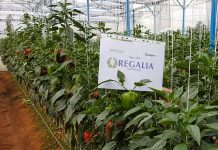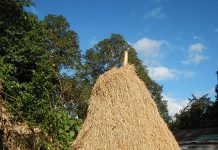Jim Lane
 In California, Ceres (CERE) announced the a realignment of its business to focus on food and forage opportunities and biotechnology traits for sugarcane and other crops. As part of the realignment, the company will restructure its Brazilian seed operations and is exploring discussions with additional local partners and collaborators to support the continued development and commercialization of its technology in Brazil.
In California, Ceres (CERE) announced the a realignment of its business to focus on food and forage opportunities and biotechnology traits for sugarcane and other crops. As part of the realignment, the company will restructure its Brazilian seed operations and is exploring discussions with additional local partners and collaborators to support the continued development and commercialization of its technology in Brazil.
Earlier, the Company announced that due to the economic challenges faced by the Brazilian ethanol industry as well as changes in the global energy market, it had expanded the number of market opportunities available for its technology and products and began prioritizing its working capital in additional areas beyond Brazil.
The news may come as a surprise to the broader community, since in March 2015 the company signed a multi-year collaboration agreement Raizen, a joint venture of Royal Dutch Shell and Cosan, to develop and produce sweet sorghum on an industrial scale.
Also, in July 2014, Ceres was selected for a competitive grant and a multi-year credit facility to fund a product development project for sorghum and sugarcane for up to approximately 85 million reais, or 27.1 million U.S. dollars, under the Brazilian government’s PAISS Agricola program.
Going forward
The Company indicated that its Brazilian operations after implementation of this aspect of the restructuring plan would be focused primarily on sorghum breeding and sugarcane. In particular, the company plans to expand its sugarcane trait development activities for the Brazilian sugarcane market, which Ceres expects to fund, in part, under a grant available from the Brazilian government.
The restructuring of the Company’s Brazilian seed operations, which is expected to be substantially completed by October 31, 2015, includes, among other actions, a workforce reduction that will impact 14 positions in Brazil primarily related to administration, operations and manufacturing as well as 2 support positions in the United States. Ceres estimates that it will incur total charges of approximately $0.6 million over the next five months with respect to these workforce reductions in Brazil and the U.S., including $0.1 million in continuation of salary and benefits of certain employees until their work is completed and their positions are eliminated, and $0.5 million of one-time severance and other costs, all of which will be cash expenditures.
“These changes represent an important step in the transformation of our business as we refocus on our strengths in agricultural technology and direct our attention to markets being fueled by global prosperity growth,” said Ceres President and CEO Richard Hamilton.
He noted that bioenergy markets have continued to face serious near-term challenges due to low oil prices, the struggling Brazilian economy, delays in second generation refining technology and unfavorable government policies, among other headwinds. “If these challenges can be surmounted then I believe the market for bioenergy feedstocks can reemerge as a global opportunity for agricultural technology companies like Ceres.”
The long timeline to Brazilian ethanol success
In April, the company wrote in its quarterly report: “With industrial processing of sorghum feedstock generally well established in Brazil, we believe that field performance – primarily yields of sugars that can be fermented to ethanol – will largely determine the scale and pace at which our current and future sweet sorghum products will be adopted. Based on industry feedback, we believe that minimum average yields in the range of 2,500 to 3,000 liters of ethanol per hectare will be necessary to achieve broad adoption.
“While we achieved yields in this range in the 2013-2014 growing season in Brazil with multiple products in multiple regions, the 2014-2015 growing season in Brazil will be necessary to validate results. Additional growing seasons beyond the 2014-2015 season may be required to fully demonstrate this yield performance across numerous geographies and for our products to gain broad adoption.
The company added in April that, “Since 2010, we have completed various field evaluations of our sorghum products in Brazil with approximately 50 ethanol mills, mill suppliers and agri-industrial facilities. During this time, our sorghum seeds were planted and harvested using existing equipment and fermented into ethanol or combusted for electricity generation without retrofitting or altering the existing mills or industrial facilities.
On to brighter horizons
Ceres advises that “Our strategy is to focus on genes that have shown large, step increases in performance, and whose benefits are largely maintained across multiple species. Trait performance is evaluated in target crops, such as corn, rice and sugarcane, through multi-year field tests in various locations. In addition, we are deploying a new multi-gene trait development system internally and believe there may be opportunities to out-license the system, known as iCODE, to other crop biotechnology companies. To date, our field evaluations have largely confirmed earlier results obtained in greenhouse and laboratory settings…At this current pace, commercial sugarcane cultivars with our traits could be ready for commercial scale-up as early as 2018.
Blade Forage Sorghum Seed and Traits
In 2015, the company expanded its sorghum offerings to include hybrids for use as livestock feed and forage. In addition to direct sales efforts, Ceres entered into a distribution agreement with Helena Chemical Company, a leading distributor of crop inputs and services. Under the agreement, Helena will provide sales and customer support for our forage sorghum in the southeastern U.S.
The current hybrids, which are traditionally bred and do not yet contain biotech traits, have performed well in numerous commercial and multi-hybrid field trials. In a 2014, in a U.S. field evaluation, one of our leading biotech traits provided a greater than 20% biomass yield advantage in a commercial-type sorghum. In 2014, we received confirmation from the U.S. Department of Agriculture (USDA) that our high biomass trait was not considered a regulated article under 7CFR 340 of the USDA’s mandate to regulate genetically engineered traits.
The Bottom Line
NexSteppe has been reporting strong momentum in Brazil and there simply may have not been room enough for two companies in Brazil, given the slowdown in the ethanol industry.
Jim Lane is editor and publisher of Biofuels Digest where this article was originally published. Biofuels Digest is the most widely read Biofuels daily read by 14,000+ organizations. Subscribe here.








